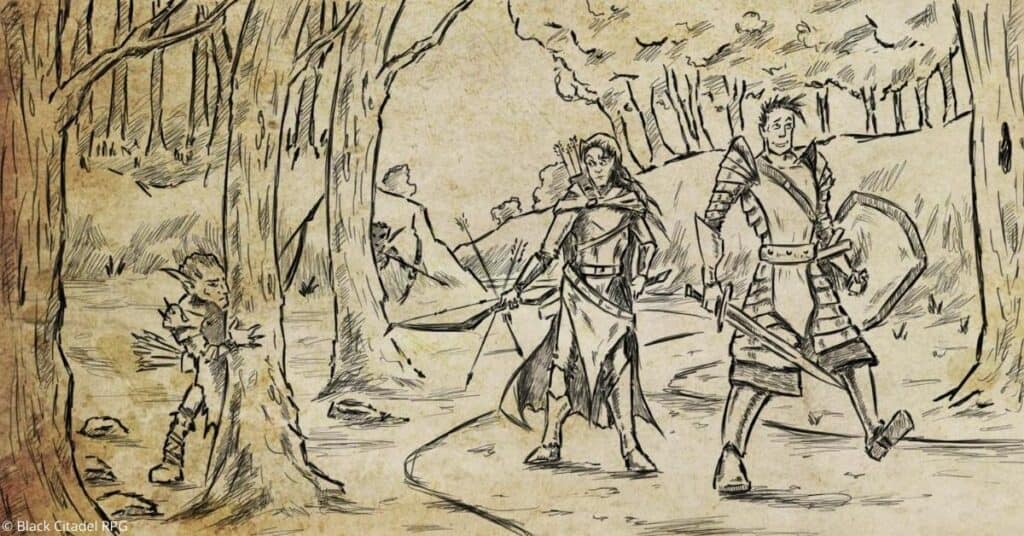If you don’t know about observant feat 5e, then don’t worry; this article is very beneficial for you. Let’s start with a little introduction.
No one likes a special event, despite any colleagues, friends, and relatives who might assume.
A surprise party is also one of the terrible things in DnD 5e.
But in all sincerity, whether you’re tired of someone being hunted down by goblins anytime you take a brief rest, possessing your day spoiled by every concealed pit, arrow trap, and deadfall you keep stumbling into or missing important clues that end up leaving you standing in the shadows scraping your heads, think about achieving the Observant feat.
This is among the best utility feats in 5e for players who wish to discover all the clues, eliminate all the tricks, and anticipate the monsters arriving before the monsters view them, with a wonderful mixture of passive Perception and Inquiry buffs, a rise in ability rating, and some nice lip-reading.
What is Feat?
The selected, criminal acts underused function of DnD 5e is feats.
Rather than selecting an Ability Score Rise, you can pick a feat when your character offers the option. A feat is a special ability, patch, or tweak that can completely alter how you perform your character.
What Does DnD 5e’s Observant Feat Activity?
A +1 to either your Intelligence or Knowledge score, the capacity to read lips. And +5 to the neutral perceptive and inquiry scores are all advantages of choosing the observant feat 5e. All of these skills drastically enhance your depth perception of your environment and level of readiness.
In 5e, the observant feat is undeniably among the most helpful. Particularly in campaigns that focus on solving mysteries, discovering the wilderness, and sneaking through dungeons.
It’s an excellent way to ensure that you are not caught by surprise by every creature. That walks around searching for a late-night snack. But it also ensures you aren’t losing out on significant details. Since you were primarily concerned with being swallowed up by a gelatinous cube.
Observant:
You obtain the following benefits if you are quick to detect specific details in your environment:
Boost your Knowledge or Intellectual capacity score by 1 to a peak of 20.
Reading a monster’s lips when it is speaking a language you know is possible if you’re able to see its mouth.
Your passive Knowledge (Perception) and passive Intellectual ability (Investigation) goals scored both obtain a +5 bonus.
How about the observant feat 5e?
Short answer: Most definitely.
Because of its capacity to merge a flat bonus with powerful positional abilities, the observant feat 5e achieves a task that few feats can: a broad range of applications.
You first get a nice boost either by your Knowledge or Intelligence.
The majority of the time, selecting a feat involves giving up the opportunity to boost your statistics; either you can boost two points by one, which is great for rounding out your character and may give you a modifier rise in 2 different stats, or you could increase one score to the subsequent even number, which gives a highly cost +1 bonus to your modifier within this ability.
Observant lessens the opportunity cost of selecting a feat across an ASI by offering you a +1 bonus to one ability score, which is brilliant. You then gain the ability to learn lips. Although there isn’t a clear strong advantage to this, there are many numerous opportunities to apply it to surveying, spying, and having to learn about your opponents’ strategies.
Lip-reading is a very valuable trait to keep in a character’s back pocket once trying to gain the better of your opponents, if you’re attempting to spot cultists along a populated masquerade ball or attempting to figure out as the next goblin patrol will depart its separated mountain cave.
The massive +5 bonus to passive Perception as well as Inquiry scores, which is what most people likely chose this particular feat for, is the final benefit.
Collecting data:
To summarize Sun Tzu for an instant, I believe that an adventurer’s capacity to collect data determines the difference between achievement and being the dragon’s main course.
Even outside their character sheets and feasibly a handout, players’ expertise of the game world restricts, the only window they possess in which to view it through the DM.
DMs are typically extra eager to continue providing data than players eventually understand. At least, I am
The truth that the players are attempting to understand as much as those who is rarely a bad thing, if they’re asking me in-depth queries about the back story of my setting (lore empties are only awesome once they’re negotiated, guys) or requesting me to define a mundane corner of a dungeon in detail so they’re like 100% sure this is stuck.
For players who have important questions, the majority of data is easily obtainable. When new players visit a brand-new area, I always try to motivate them using all five senses.
I might notice two or three, but then any player who asks, “What is it smell like in it now? when I’ve explained a cave is causing problems. Can I smell anything that could imply there is life here? is undoubtedly going to receive some free information including such:
“You breathe deeply, starting to smell an uncomfortable mixture of animal musk and moisture. Likewise, you catch a pungent scent of woodsmoke and charred meat emerging from the distant end of the cave. a fire for cooking.
Details:
I might have defined the odor of the goblins able to hold an improvised luau. So over smoldering stays of the last adventuring party who managed to stumble unthinkingly into their lair. If they’d simply walked to the back into the cave.
However, by that spot, the party would just be close sufficient to the goblins to warrant Interpretation and Stealth inspections. With the possibility for items to get messy, truly fast – like any good luau.
The players are informing me, the DM, whatever they’re paying attention to by asking specific inquiries.
We’ve all started walking throughout a room, blindly concentrated on our feelings, and missed things evident (goblins in grass skirts trying to dance around a human spit roast could be an extreme case, but how do I remember?).
I wasn’t paying close attention), so having to tell me that they desire to concentrate on a specific sensation is, in my viewpoint, the key to certain extra details. Primarily, I would like to motivate players to ask appropriate questions rather than rolling the “correct number” on a d20.
Players must ask more questions:
Top DM tip: Respond to them.
Of course, some data is inaccessible.
There are many situations in which the players must depend on more than just their 5 senses. Whether it’s observing a goblin attack or perceiving a set of old runes.
This is when the dice play a role (investigating a region for secret areas, attempting to make a Perception check for tricks, etc). Or the players have to do something to try to gather that data without rolling. Such as pressing sections of stone with a hammer and paying attention to hollow sounds. Or having one amongst your retainers poke the glowing orb to determine what it does.
This is the type of thing I always attempt to encourage. Even though rolling the dice at my table wants to invite failure and thus implications. However, all of the player cunning and +7 Perception controls in Faerun won’t change the fact that some players roll poorly.
More about it:
Generally, whenever it occurs, unpleasant sensations occur. Such as a surprise birthday event attended by each of your most eccentric elderly family members.
Likewise, as a DM, trying to ask players for a Perspective check can, sometimes those who fail, notify those players that there’s an important element that they’ve missed.
If they’re great hosts, they’ll just maintain doing what they’ve been doing. Their characters will change, but the players are frustrated.
While I appreciate player anger when it is validated (as an outcome of an especially poorly planned, for instance). Observing my players becoming frustrated because they start believing an arbitrary dice roll has only just screwed them out of the following step in the adventure is just no fun at all.
Fortunately, passive Perception and Inquiry are used for this. This is why the Observant feat is such a blessing to DMs, not to notice a possible lifesaver for the players’ actors.
An Overview of Passive Perception and Inquiry:

Every character in DnD 5e has silent perception and neutral investigation statistics.
They add 10 to your Knowledge and Intellectual ability modifiers. To generate a static amount that defines how conscious a character seems to be of their surroundings. This means that, instead of needing a Perception or Investigation check. The DM can purely compare, say, the outcome of a monster’s Stealth inspection to the party’s passive Perception scores to decide if they are surprised.
This can also be employed to decide whether players spot traps. Start noticing clues, and gaining data about their surroundings when asking for a check may lead to confusion among players. And character knowledge unless they fail.
Scott:
Scott created a fantastic guide to passive perception, that may be present here. If you are still having a hazy knowledge of the concept, I strongly recommend it. Thanks a lot, Scott! The observant feat 5e provides you a +5 bonus both for your passive Perception and Inquiry, which indicates your character is much more likely to uncover valuable information just by walking through a room.
Like to feel like Sherlock (the great kind, from Guy Richie films or Elementary, not Stephen Moffat’s raging dumpster fire of smugness – do not even @ me) as you splash up and filter through useful hints to pull a super satisfactory conclusion apparently out of thin air?
How about an arcane language professor? Or how about Mulder from The X-Files? The Observant feat will bring you a lot more similar to your fantasy.
Which Classes Work Much better With the Observant Feat?
Better outcomes with the observant feat 5e depend on you having a good Wisdom and/or Intellectual ability score to start with.
Not to notice that the +1 bonus to Knowledge or Intelligence will feel wasted on classes that favor a more, ahem, straightforward approach to problem-solving. As a result, almost every Wisdom- or Intelligence-based class is just a good fit for the Observant feat. Although some subclasses which use Intelligence or Wisdom as secondary statistics (or possess some pretty synergistic skills) are also a great fit.
Ranger Masters and mistresses of the wilderness, rangers excel at investigating unmapped terrain and monitoring their enemies. And are frequently depended on by groups to be the only ones who can continuously roll above a 15. When attempting to make checks to prevent being popped by wandering monsters.
The observant feat 5e purely enhances everything. It’s a means of telling your DM, “No, thank you, I’m not going to engage with any tricks in this advertisement.”
Rangers use Knowledge to strengthen their (obviously small) spellcasting, so introducing a point to this capacity score is not a waste.
Druid:
Druids seem to be perfect candidates for the observant feat 5e as they possess Wisdom as their main ability. The capacity to read lips remains when you are in your wild form.
Simply convert into something with great vision, climb the nearby tree (or fly 200 feet just above the enemy fortress as a falcon). And come back to the party within 20 minutes with a detailed story on the BBEG’s evil plan.
Wizard/Artificer Druids and rangers just use observant feat 5e. Even though they attach a high value to Knowledge. Putting the Observant feat on a Wizard. Or Artificer is a wonderful way to highlight a strong analytical issue character.
At the decline of a hat, fix magical puzzles and decipher strange runes. And an extra game in your spellcasting modifier will not hurt either.
Background of the City Watch/Investigator:
The City Watch/Investigator backstory is an excellent place to begin. If you want to construct a character from 1st level all around Observant feat (using either variation human or even the custom lineages from Tasha’s Cauldron of Everything).
You make progress in Investigation – which would be useful even though classes and races frequently grant the alternative of being skillful in Perception. In addition to a knack for finding local checkpoints and dens of criminal behavior. Ideal for just a detective who solves crimes by stepping on both sides of the law.
The Sharp Mind’s Performance:
The Sharp Mind feat helps to give you some good impact options. That combines brilliantly with Observant, furthermore to some other juicy little +1 bonus to your Intelligence.
You could always find your loads, understand however many hours until dusk. And keep a month-long visual memory – perfect for incorporating with Observant; the more you see, the more you note.



